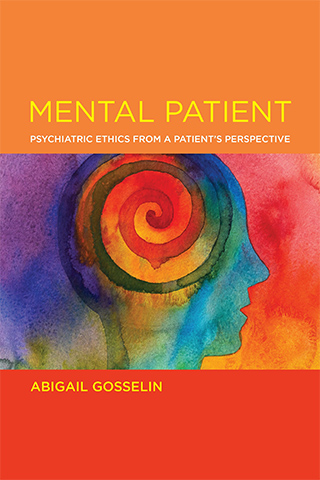What Hallucinations Can Sometimes Be Like

Before I was hospitalized for psychosis a few years ago, I had sporadically seen therapists. The first one I liked a lot, but she left the practice. The next one didn’t seem to understand me, so I stopped seeing her after three sessions and went therapist-free for several years. During this time, I met with my psychiatrist annually.
When I met with my psychiatrist in the spring of 2018, psychotic and suicidal, he strongly recommended that I start seeing a therapist again. He gave me the names of a couple of people with whom he was familiar and recommended. I was able to get in to see one of them, but I never clicked with her. She thought I had too much insight into the problems I had and didn’t believe me when I told her I heard a voice telling me to kill myself. I left every session feeling worse than I did when I went into it.

My suicidal ideation grew worse over the course of seeing her that spring, and after the third time, I became unhinged. I called the crisis hotline several times that weekend, and they got me an appointment with another recommended therapist.
Seeing this therapist was an entirely different experience. The first thing he did at our initial session was to lean in toward me and ask me what was going on. His body language indicated that he was deeply interested and fully engaged. He never looked at his computer during the session. After I spoke, he rephrased what I said in a way that made me know that he understood what I was saying. He validated my suffering and noted that I was barely holding on. He took my psychotic symptoms seriously and helped me identify them as psychotic. His ability to read me so well made me trust him inherently. At the end of the session, he suggested I think about hospitalization since I was having such a difficult time keeping myself safe.
Two days later I went to the crisis center and turned myself in to be hospitalized (or so it felt, since I had felt like I had been running on the lam for months). I only had the courage to reach out to the crisis center because of his suggestion and because I inherently trusted him, even though I had just met him. I trusted him because I felt that he understood me in a way that few people did.
Empathizing with Psychotic Patients
Clinicians often have to make a special effort to learn how to empathize with patients who experience psychosis. Empathizing with people who exhibit psychotic symptoms is more difficult than empathizing with people showing other symptoms, even other mental health symptoms. After all, psychotic patients fundamentally experience the world differently and engage in behaviors and entertain ideas that seem foreign and mystifying.
One element of psychosis that is particularly difficult to understand for clinicians who want to see their patients improve is why many of them don’t work hard on getting better. They seem uninterested, unwilling, and unmotivated to take the steps required for well-being, such as eating healthier, sleeping on a regular cycle, or exercising. Oftentimes, they don’t take their medication as prescribed or attend recommended therapy sessions.
Psychotic patients fundamentally experience the world differently and engage in behaviors and entertain ideas that seem foreign and mystifying.
From the clinician’s point of view, it would seem obvious that a person experiencing psychosis would want to get better. Being out of touch with reality and experiencing hallucinations, delusions, and paranoia sounds scary. Hearing voices that are usually negative in nature would be distressing. Having confused thoughts and illogical ideas seems like it would be terrifying. Being unable to interact with others in socially appropriate ways and unable to maintain meaningful relationships seems tragic. From this vantage point, why wouldn’t someone want to work hard to alleviate their psychosis?
The fact that many psychotic patients do not appear to work hard at getting better is, of course, usually a function of their illness. Sometimes the problem stems from negative symptoms of psychosis: Apathy, disinterest, lack of motivation, lethargy, social withdrawal, and difficulty completing tasks can make it so a patient doesn’t care about getting better, or have the motivation and energy required to make changes, or simply are unable to translate their will into action. Sometimes it can be too difficult for a person to comprehend what changes they need to make, or to organize themselves enough to commit to make changes and follow through on this commitment.
Sometimes, however, positive symptoms — perceptions without physical causes, like hallucinations and delusions — can play a role, as they can provide contrary motivation that makes a person resistant to making changes.
Staying committed to working on recovery was something I struggled with quite a bit, as I often went back and forth between begging my clinicians to help me deal with my distress and resisting their recommendations, because, in my psychosis, I wanted to stay psychotic. Here I want to shed some light on why a psychotic person might not want to let go of their psychosis by focusing on the role that hallucinations can play in a person’s life. This can help us to comprehend psychotic patients’ motivation in resisting their clinicians’ attempts to treat their hallucinations.
Let us look at some of the assumptions that people commonly have about hallucinations to see how psychotic patients’ experiences sometimes differ from these assumptions so we can better understand why a person might want to hold onto their hallucinations.
What Hallucinations Can Sometimes Be Like
One assumption that is commonly made is that hallucinations are unequivocally distressing. When people who do not hallucinate imagine what it is like to hear voices telling a person what to do, they imagine that this would be a difficult and terrifying experience.
Auditory hallucinations can be distressing, of course. Factors that contribute to distress include the belief that voices are omniscient and omnipotent, the belief that voices have malevolent intent, and the belief that voices are uncontrollable. Auditory hallucinations are not always distressing, however. Many people have voices that are benign or even positive, and most people hear both positive and negative voices (voices that are disparaging). Positive voices give advice, encouragement, and information, and they provide reassurance, comfort, and companionship; sometimes they help patients deal with negative voices. Whether the voices are experienced as distressing or not, many people like their voices because the voices keep them company, are comforting, or confer a sense of specialness. People frequently form complicated relationships with their voices. Voices can keep loneliness at bay, provide motivation, shape identity, and exact a pull over a person that dictates their action and way of being in the world (particularly command hallucinations). As a result, people often hold complicated feelings toward their voices even when their voices are predominantly negative.
Suddenly the voice appeared and told me that if I let it out of its cage, it would keep me company at all times; I would never have to feel lonely again.
For example, even though the voice I heard frequently told me to kill myself, I welcomed the voice as a companion. One afternoon after my depression had finally receded in spring 2019, I was sitting in my office waiting for the hours to pass until it was time to attend a late afternoon meeting and feeling desperately lonely and empty. Suddenly the voice appeared and told me that if I let it out of its cage, it would keep me company at all times; I would never have to feel lonely again. That night I started reducing my antipsychotic medication so the voice would stay with me, and I continued to struggle with taking my medication for much of that spring. While the resulting increased psychosis caused me distress, I no longer ever felt lonely. For me, the voice solved a problem. Clinicians wanting to understand why I struggled to take my medication as prescribed would have to understand what roles the voice played for me.
Voices can also provide meaning. Hallucinatory experiences often involve heightened sensory awareness and can feel momentous and significant. Hallucinations can be imbued with meaning that is only accessible to the person experiencing them. One of the features of auditory verbal hallucinations is the way their meaning supersedes whatever linguistic meaning the words heard convey. In other words, a person may hear a simple message — for example, “Act natural” — but the meaning of this message to the voice-hearer may involve persecutory delusions and beliefs about what it is to be “natural” that go beyond what the words by themselves suggest. Voice-hearers may not be able to articulate verbally the meaning that is conveyed in a message, perceiving that the message opens up a layer of reality that was previously inaccessible, and that is apparent to no one but the perceiver. There is a richness of meaning that hallucinations may convey; hallucinations can be experienced as sources of awe and wonder. Even when they are distressed by their voices, people often find meaning in the voices that they are hesitant to eliminate.
It is important to note that, while many people who hear voices do suffer from the experience, they tend to be harmed more by other connected aspects of psychosis than by the auditory hallucinations themselves. Delusions can impede a person’s ability to have knowledge about the world and self-understanding and insight, leading to losses of epistemic and moral agency. Delusions also can impact the way a person engages with other people and with the world much more than hallucinations do; feeling a gap between the world inside one’s mind and the external world can make interacting with the external world very difficult, awkward, and distressing. Moreover, cognitive dulling, memory loss, detachment, social withdrawal, and other negative symptoms related to psychosis can create more problems with functioning than hallucinations do.
In my experience, feeling like I had dementia was by far the most debilitating aspect of psychosis because it made it so that I could not understand the world around me even when I tried. By creating massive confusion and misunderstanding and by severing the connection a person has to the world around them, cognitive dulling can decrease epistemic agency, or the capacity to process knowledge, in a significant way. Furthermore, memory loss can separate a person from their past; by erasing their connection to the past, memory loss erases self-identity. Social withdrawal can isolate a person, leading to many losses, while apathy and lethargy can make a person unable to make choices and take action. We often treat hallucinations as if they are the chief problem of psychosis, but delusions, cognitive dulling, memory loss, lethargy, and apathy can be just as debilitating.
Another assumption that is sometimes made is the idea that auditory hallucinations are an isolatable symptom that can be experienced apart from other symptoms. For people who experience auditory hallucinations due to neurological disorders, or for people in the general population who experience them, this impression may be true: Auditory hallucinations may stand alone, isolatable from other aspects of experience. For people who are psychotic and experiencing auditory hallucinations, however, this is often not true. Hallucinations are usually connected to other aspects of psychosis, including delusions, paranoia, a sense that the world is less real or has a changed reality, a feeling of alienness that affects one’s interaction with other people, and disorganized thinking that sees connections where there are none and that reasons in illogical ways. Hallucinations are typically tied to delusions about the source of the hallucination (for example, coming from an object or entity) or the nature of the hallucination (for instance, a command from God, a message aimed directly and solely at the person having the hallucination, or secret messages hidden in the universe needing to be decoded). Hallucinations are often part of the person’s overall distorted sense of reality, affecting how the person interacts with others and with the world, and are in some cases connected to paranoia.
A third assumption that is commonly made about hallucinations is that what is frightening about hallucinations is the incorrectness of the perception, the way that it does not match reality. Hallucinations are often not experienced as being out of sync with an otherwise correct world, however. Instead, they tend to be part of an overall change in one’s experience that affects one’s way of being in the world.
A common misconception about hallucinations is the assumption that people who hallucinate cannot tell the difference between their hallucination and the shared reality that everyone experiences. For example, authors of a study on voice hearing simulations claimed that “a person who does experience auditory hallucinations will not know whether other people can hear the voices or noises that they can.” In fact, most people who hear voices know that they are hearing something others do not hear and can tell the difference between what they experience and the shared reality that others experience. What is significant is that this knowledge does not negate the knowledge and insight they gain from the experience of having the hallucination; in other words, as Ivan Leudar and Philip Thomas explain in their study of verbal hallucinations, knowing that others do not hear their voices does not take away from the way the voices are experienced as subjectively real to them. The fact that the experience of hearing voices does not match shared reality is not the basis of fear or distress for people who actually hear voices; psychotic individuals accept that their experience does not fit with the reality that others experience.
Most people who hear voices know that they are hearing something others do not hear.
What is sometimes frightening about hallucinations is not that they involve incorrect perception, but that they shift a person’s attention away from shared reality to an idiosyncratic experience of reality that only they experience. Psychotic patients often know that the voices they hear are not part of the reality that everyone else experiences, but they have the sense that the voices are part of a reality that only they can experience, which makes their experience special and significant. This added layer of meaning can be frightening when a person recognizes that it removes them from the reality that everyone experiences, but it can also be thrilling because it provides purpose, meaning, joy, and pleasure.
Typically, hallucinations are not experienced by psychotic patients as being wrong or in error, the way some people might suppose; they are experienced as being absolutely correct. Thus, the problem for people who actually experience auditory hallucinations often is not that they perceive a wrong reality, but that the reality they perceive removes them from the reality they share with others. This retreat into their own private mental world has significant effects on functioning and well-being, and it can lead to dysfunctions in work and home life, changes in attention, sleep, and appetite, social withdrawal and avoidance, and neglect of personal hygiene.
The authority of command hallucinations is particularly hard to understand. A person who has not experienced command hallucinations may suppose that hearing a voice issuing a directive is like hearing someone else telling a person what to do, where the person has the freedom to obey or not and can articulate, if they so choose, reasons why they should or should not obey. For a person who actually hears voices, on the other hand, hearing a voice issuing a directive can be like having a family member telling them what to do. A person who hears voices may have been hearing them for some time and may have developed a relationship with them. Within the context of that relationship, a command holds special meaning and has special force. Disobeying a command can be more like disobeying one’s parent, something many of us are not comfortable doing. The agony that a person who actually hears voices may experience when they hear commands telling them what to do, when they do not want to follow through, is not only the annoyance of being told to do something contrary to one’s will. In some cases, the agony comes from the persistence of the command, the way it will not go away no matter how much a person tries to resist it and distract themselves from it. But in many other cases the agony comes from the existential struggle involved with wanting to resist something that has special hold over the person. Again, it is like the agony many of us would experience if we tried to resist doing what our parent requested of us. It can make us question our identity (whether we are still good children to our parent) and second-guess ourselves (“Am I doing what is right by trying to resist?”). Resisting a voice that a person has a relationship with can feel like committing a betrayal, and it is not something a person can do lightly, if at all.
Another assumption that people commonly have is that hallucinations and delusions are globally debilitating, that they can make it impossible for a person to function. When people believe this, they endorse the stereotype that people with severe mental illness are incompetent and unable to succeed in life. This assumption was probably underlying the reaction of the first therapist I saw when I was psychotic: She couldn’t see how someone as functional as I generally am could be as sick as I claimed to be. But a person can sometimes function reasonably well while psychotic because they can compartmentalize their psychotic experience and separate it from other aspects of their life. Knowing that others would not approve, sometimes a person can become good at hiding their psychosis from others.
Moreover, a person who gets sick episodically, like myself, can function very well when their illness is in remission but then function very poorly when the illness blossoms. If a person has a job with a lot of flexibility, and supportive family and friends (as I do), they can manage to get by through their less functional periods without necessarily causing great and lasting harm to their lives. I am successful because I have periods of my life when I am well, and I have a job with a lot of flexibility, which makes it easier to get by when I can’t function well. When I am doing poorly, this does impair my work and family life and threaten my job and family stability. A good therapist can recognize that a person can appear to function well despite severe illness, but also needs to recognize that illness can threaten the building blocks of a successful life.
When clinicians believe that hallucinations are intrinsically distressing, they may have no appreciation for the role that hallucinations can play in a psychotic person’s inner life: the way they can affect a person’s meaning structure, orientation to the world, and even identity and agency. When clinicians believe that psychosis is globally debilitating, they may fail to recognize when patients who appear to be functioning reasonably well are sick. Even when psychosis is on the balance impairing and distressing, it can still hold value to a person that must be acknowledged and accounted for. Without an appreciation of this value, clinicians may not understand how a person who experiences auditory hallucinations can become attached to their hallucinations. When a person sees their voices as disclosing secret meaning, when the voices color experience as momentous and significant, and when the voices confer a status of specialness to both the experience and the person experiencing it, the voices are something to be welcomed and even sought after rather than something to avoid.
For this reason, people who experience auditory hallucinations may not want to take prescribed antipsychotic medicine: they may like the connection they have to a special and unique reality that psychosis offers them. Clinicians who do not understand how attached someone can get to their voices lack an understanding of one of the sources of nonadherence to treatment and will be frustrated when patients refuse to take their medicine or otherwise participate in their treatment.
Psychotic patients often want to hold onto their hallucinations for many reasons, including to experience the special meaning they convey, to see the world as extraordinary, and to obey the voices that tell them to do so. All of these factors played a role in my struggle to participate in recovery. In order to be more committed to my recovery, I needed to work with clinicians who understood these aspects of psychosis so they could help me address them. I needed my clinicians to have empathetic understanding of what my psychosis was doing to me.
Abigail Gosselin is a Professor of Philosophy at Regis University in Denver, Colorado and the author of “Mental Patient,” from which this article adapted. A freely downloadable open access edition of the book can be accessed here.




